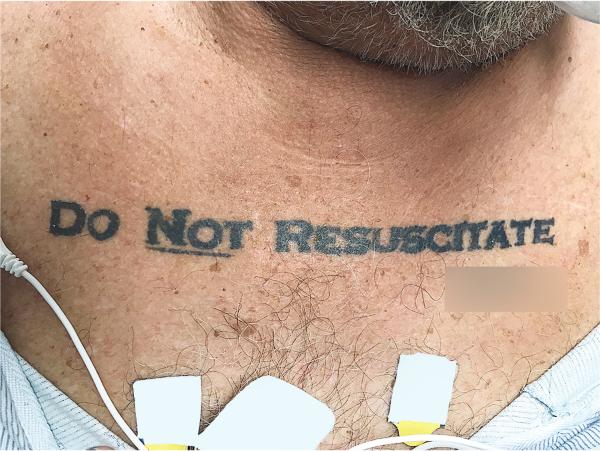The odd case of a stricken man arriving at a Florida hospital with no identification, no personal accompaniment – but with a prominent tattoo across his chest stating that critical, life-saving intervention be withheld – is serving as a bizarre but essential reminder to the rest of us to raise a difficult, frequently-skirted topic.
A recent letter published in the New England Journal of Medicine recounted the case of an unconscious 70-year man with a high blood-alcohol level who was brought to the emergency department of a Miami hospital. Doctors, faced with no information about the white, bearded male patient – since he had no wallet and did not arrive with a family member or friend – were conflicted about what level of care to provide. Meanwhile, others at Jackson Memorial Hospital tried in vain to identify next of kin and corroborate the man's body-inked demand with any paperwork that may have been previously filed.
The conflict, as you surely have determined, stems from the tattoo near his collarbone that read in dark, block letters "DO NOT RESUSCITATE," which even included the man's signature below it. The unique directive was characterized by the doctors as an "extraordinary effort to make his presumed advance directive known," according to the letter, written by the attending physicians providing details of the extraordinary case.
While this DRN direction was seemingly clear to casual bystanders, to the doctors it was anything but. The tattoo only served to sow confusion, because according to them it raised "the principle of not choosing an irreversible path when faced with uncertainty."
 Among the questions raised: Did this man actually want (or literally, in this case, not want) what he had emblazoned on his chest? Or did he get the tattoo impulsively, or when he wasn't in a clear-thinking state? Doctors had no way to know. As a result, in the meantime, they administered some care addressing his immediate distress. However, the patient, whose medical history included "chronic obstructive pulmonary disease, diabetes mellitus, and atrial fibrillation," was never able to communicate so the mystery was never solved in person.
Among the questions raised: Did this man actually want (or literally, in this case, not want) what he had emblazoned on his chest? Or did he get the tattoo impulsively, or when he wasn't in a clear-thinking state? Doctors had no way to know. As a result, in the meantime, they administered some care addressing his immediate distress. However, the patient, whose medical history included "chronic obstructive pulmonary disease, diabetes mellitus, and atrial fibrillation," was never able to communicate so the mystery was never solved in person.
Faced with this uncertainty, it was then that doctors contacted physician-ethicists for advice and direction, who concluded the following:
"They suggested that it was most reasonable to infer that the tattoo expressed an authentic preference," the letter stated, and "that what might be seen as caution could also be seen as standing on ceremony, and that the law is sometimes not nimble enough to support patient-centered care and respect for patients’ best interests." The result was that a "DNR order was written."
Doctors subsequently learned that the unidentified man, who later died, did, in fact, file an "out-of-hospital" DNR with the Florida Department of Health. As such, the patient's last wish was indeed honored, doctors wrote, who withheld "cardiopulmonary respiration or advanced airway management."
Precise statistics on DNR orders are difficult to come by, but it's widely believed that discussing the topic is often put off for obvious reasons. However, given extreme situations such as this, no one – not the individual at life's end, nor the doctors orchestrating his or her care – benefits from uncertainty. Therefore, if you or a family member hasn't addressed this delicate issue, hopefully this case serves as a reminder to do so. And this isn't limited to the decision whether to resuscitate or not. It also includes selecting a health care proxy, to make other choices for you in the case you cannot communicate.
And as for that will ...




